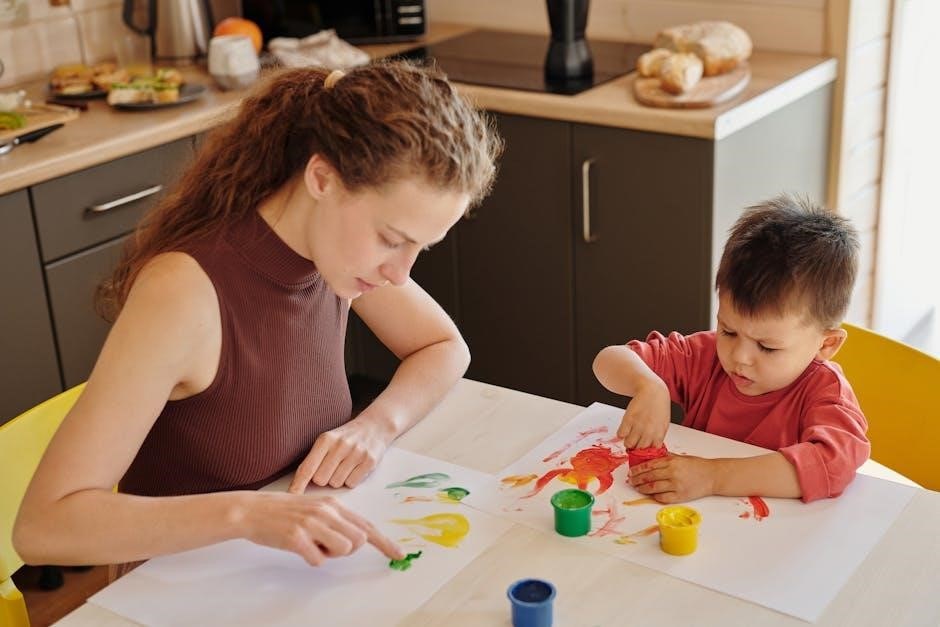Happiness is a profound and dynamic skill that can be cultivated. Matthieu Ricard‚ a scientist turned monk‚ emphasizes that happiness is developed‚ not discovered‚ making it life’s most important skill.
1.1 Defining Happiness
Happiness is a dynamic and deeply personal experience‚ often described as a state of well-being‚ joy‚ and fulfillment. It is not merely a fleeting emotion but a lasting sense of contentment. Matthieu Ricard‚ a renowned Buddhist monk‚ defines happiness as an enduring state of mind that arises from cultivating inner peace and compassion. Unlike temporary pleasures‚ true happiness is rooted in a mindset that values life’s deeper meanings. It involves balancing emotions‚ embracing gratitude‚ and fostering meaningful connections. Happiness is not a destination but a skill that can be nurtured through practice‚ reflection‚ and intentional living. By understanding its essence‚ we can better navigate life’s challenges and create a pathway to authentic‚ sustainable happiness.
1.2 The Importance of Happiness in Life
Happiness plays a pivotal role in shaping a fulfilling and meaningful life. It fosters mental clarity‚ emotional resilience‚ and a positive outlook‚ enabling individuals to navigate life’s challenges with grace. Happy people tend to have stronger relationships‚ better health‚ and greater productivity. Matthieu Ricard‚ a Buddhist monk‚ highlights that happiness is not just a feeling but a skill that enhances overall well-being. By cultivating happiness‚ individuals can reduce stress‚ improve their quality of life‚ and create a ripple effect of positivity around them. Prioritizing happiness empowers us to embrace life’s opportunities and adversities with balance and gratitude‚ leading to a more purposeful and satisfying existence.

Understanding the Science of Happiness
The science of happiness reveals its roots in neuroscience and psychology‚ exploring how emotions and thoughts shape well-being‚ as highlighted by Matthieu Ricard’s research and insights.
2.1 The Role of Neuroscience in Happiness
Neuroscience has significantly advanced our understanding of happiness by studying brain function and emotional states. Matthieu Ricard‚ a molecular biologist turned Buddhist monk‚ has been studied as one of the happiest people alive. His brain scans reveal heightened activity in areas associated with joy and compassion. Neuroscience shows that happiness is not just a fleeting emotion but a state influenced by brain circuits that can be strengthened. By understanding how neuroplasticity works‚ we can reshape our brains to cultivate positive emotions. This scientific perspective underscores that happiness is a skill that can be developed through practice‚ offering a tangible path to lasting well-being.
2.2 Psychological Factors Influencing Happiness
Psychological factors play a crucial role in shaping happiness. Matthieu Ricard highlights that emotions like compassion‚ gratitude‚ and loving-kindness foster well-being. Positive thinking and mindset significantly influence happiness‚ as they shape how we perceive life’s challenges. Psychological resilience‚ the ability to adapt to adversity‚ also contributes to sustained happiness. Additionally‚ social connections and meaningful relationships are vital‚ as humans thrive on emotional support and belonging. Psychological practices such as mindfulness and emotional regulation further enhance happiness by helping individuals manage stress and negative emotions. By understanding and nurturing these psychological elements‚ individuals can cultivate a mindset that supports lasting happiness and fulfillment in life.
Cultivating Happiness Through Mindset
Happiness is cultivated through mindset. Matthieu Ricard‚ a scientist turned monk‚ emphasizes that happiness is developed‚ not discovered‚ making it life’s most important skill.

3.1 The Power of Positive Thinking
Positive thinking is a cornerstone of happiness. By focusing on optimism‚ we can rewire our brains to perceive challenges as opportunities for growth. Matthieu Ricard highlights that happiness is cultivated through mental training‚ emphasizing the importance of mindfulness and gratitude. Simple practices like journaling or reflecting on positive experiences can shift our mindset. When we embrace positivity‚ we build resilience‚ fostering a deeper sense of well-being. This mindset not only enhances personal joy but also improves relationships and overall life satisfaction. By consciously choosing positive thoughts‚ we pave the way for lasting happiness.
3.2 Developing a Growth Mindset
A growth mindset is essential for cultivating happiness. It involves embracing challenges‚ viewing failures as learning opportunities‚ and believing abilities can be developed through effort. This mindset fosters resilience‚ adaptability‚ and confidence‚ all of which are crucial for well-being. By focusing on progress rather than perfection‚ individuals can navigate life’s obstacles with optimism. Matthieu Ricard’s teachings emphasize that happiness is rooted in mental training‚ making a growth mindset a powerful tool. It encourages self-awareness‚ curiosity‚ and persistence‚ leading to personal and emotional growth. Cultivating this mindset helps individuals thrive in an ever-changing world‚ contributing to a more fulfilling and joyful life. It is a key skill in developing lasting happiness and life satisfaction.

Practical Steps to Achieve Happiness
Happiness is cultivated through intentional practices like gratitude‚ mindfulness‚ and nurturing relationships. Matthieu Ricard highlights that developing self-awareness and positive habits leads to lasting well-being and fulfillment.
4.1 Practicing Gratitude Daily
Practicing gratitude daily is a powerful tool for cultivating happiness. It involves consciously recognizing and appreciating the positive aspects of life‚ no matter how small they may seem. Matthieu Ricard‚ a renowned expert on happiness‚ suggests that gratitude shifts focus from what is lacking to what is abundant‚ fostering contentment. Simple practices like keeping a gratitude journal or sharing appreciation with others can significantly enhance well-being. Neuroscience supports this‚ showing that regular gratitude practice strengthens brain pathways associated with joy and positivity. By incorporating gratitude into daily routines‚ individuals can develop a more optimistic outlook‚ improve relationships‚ and build resilience against life’s challenges‚ ultimately nurturing a deeper sense of happiness and fulfillment.
4.2 The Impact of Mindfulness on Happiness
Mindfulness profoundly influences happiness by fostering present-moment awareness and reducing stress. Practicing mindfulness‚ such as through meditation or deep breathing‚ helps individuals appreciate life’s small joys and cultivate emotional balance. Matthieu Ricard highlights that mindfulness trains the mind to focus on positive experiences‚ enhancing overall well-being. Regular mindfulness practice strengthens neural pathways linked to joy and resilience‚ according to neuroscience. By being fully engaged in the present‚ people can better manage negative emotions and develop a clearer perspective on life. Incorporating mindfulness into daily routines not only improves mental health but also nurtures a deeper sense of contentment and fulfillment‚ making it a vital skill for achieving lasting happiness and emotional stability.
4.3 Building Strong Relationships
Strong relationships are a cornerstone of happiness‚ fostering emotional connection and support. Matthieu Ricard emphasizes that meaningful bonds with others‚ rooted in empathy and kindness‚ significantly enhance well-being. Cultivating trust‚ communication‚ and understanding in relationships helps create a sense of belonging and security. Nurturing friendships and family ties through active listening and shared experiences strengthens these connections. Compassion and respect within relationships allow individuals to thrive emotionally. By prioritizing and investing time in building positive interactions‚ people can develop a supportive network that contributes to lasting happiness and life satisfaction.


Overcoming Obstacles to Happiness
Overcoming obstacles to happiness involves addressing challenges like stress and anxiety. Matthieu Ricard highlights the importance of resilience and mental well-being in navigating life’s difficulties effectively.
5.1 Managing Stress and Anxiety

Managing stress and anxiety is crucial for achieving happiness. Effective techniques include mindfulness‚ deep breathing‚ and physical activity‚ which help reduce tension and promote calmness. Setting realistic goals and maintaining a healthy lifestyle also play significant roles in managing stress. Additionally‚ limiting negative influences and practicing gratitude can further enhance emotional well-being. By adopting these strategies‚ individuals can better navigate life’s challenges and cultivate a more peaceful mindset‚ ultimately contributing to their overall happiness and life satisfaction.
5.2 Coping with Negative Emotions
Negative emotions are natural‚ but they can hinder happiness if not addressed. Mindfulness and acceptance help acknowledge these feelings without judgment. Practices like loving-kindness and compassion can transform negative emotions into positive experiences. Reframing thoughts and shifting perspectives also play a key role. By fostering resilience and emotional intelligence‚ individuals can better navigate life’s challenges; Matthieu Ricard emphasizes that developing inner conditions for happiness involves managing emotions skillfully. Cultivating gratitude and self-awareness further supports emotional balance. Learning to cope with negative emotions is essential for nurturing a stable and joyful mindset‚ ultimately enriching one’s overall well-being and life satisfaction.
The Role of Habits in Sustaining Happiness
Habits play a crucial role in sustaining happiness by creating consistent routines that promote well-being. Positive daily practices‚ physical activity‚ and balanced nutrition foster lasting joy and resilience.

6.1 Creating Positive Daily Habits
Creating positive daily habits is essential for nurturing happiness. Consistent practices‚ such as mindfulness or gratitude journaling‚ help train the mind to focus on joy and fulfillment. Matthieu Ricard suggests that simple exercises can foster happiness by concentrating on life’s fundamentals. Habits like regular physical activity and balanced nutrition also support mental well-being. By incorporating these routines‚ individuals develop resilience and a stable foundation for lasting happiness. Positive habits create a mindset that embraces life’s challenges with optimism and grace‚ making happiness a sustainable skill. Over time‚ these practices become second nature‚ leading to a fulfilling and joyful life. Consistency is key to transforming habits into a lifelong source of happiness.

6.2 The Importance of Physical Activity
Physical activity plays a vital role in cultivating happiness by enhancing both physical and mental well-being. Regular exercise stimulates the release of neurotransmitters like endorphins‚ which elevate mood and reduce stress. Activities such as walking‚ yoga‚ or cycling promote a sense of accomplishment and energy. Matthieu Ricard highlights that physical well-being supports mental clarity‚ fostering conditions for inner peace. Consistent movement helps maintain a balanced lifestyle‚ reducing anxiety and improving sleep quality. By incorporating varied exercises‚ individuals can sustain motivation and enjoy the long-term benefits of physical activity on their mood and overall happiness. Regular exercise is a practical step toward nurturing life’s most important skill—happiness.
6.3 Nutrition and Its Impact on Mood
Nutrition significantly influences mood and emotional well-being. A balanced diet rich in fruits‚ vegetables‚ whole grains‚ lean proteins‚ and healthy fats supports brain health by stabilizing neurotransmitters like serotonin and dopamine‚ which regulate happiness. Omega-3 fatty acids found in fish enhance brain function‚ while antioxidants in berries reduce inflammation linked to improved mental health. Vitamin D‚ present in fatty fish and fortified cereals‚ plays a crucial role in mood regulation. Proper hydration is equally important‚ as even mild dehydration can impair mood and cognitive function. A healthy gut microbiome‚ supported by fiber and probiotics‚ fosters a strong gut-brain connection. Informed nutritional choices create a foundation for emotional well-being‚ aligning with Matthieu Ricard’s teachings on cultivating inner conditions for happiness‚ aiding in developing life’s most important skill.
Happiness‚ as a skill‚ is cultivated through mindset‚ habits‚ and intentional choices. Matthieu Ricard’s teachings highlight that true happiness stems from inner peace‚ compassion‚ and gratitude. By embracing a growth mindset‚ practicing mindfulness‚ and nurturing relationships‚ individuals can foster lasting well-being. Simple yet profound practices like journaling‚ physical activity‚ and balanced nutrition further support this journey. Happiness is not a destination but a continuous process of self-awareness and kindness. Matthieu Ricard reminds us that just as we train our bodies‚ we must train our minds to embrace joy and fulfillment. This guide equips you with the tools to develop life’s most important skill—happiness—empowering you to live a meaningful and joyful life.
